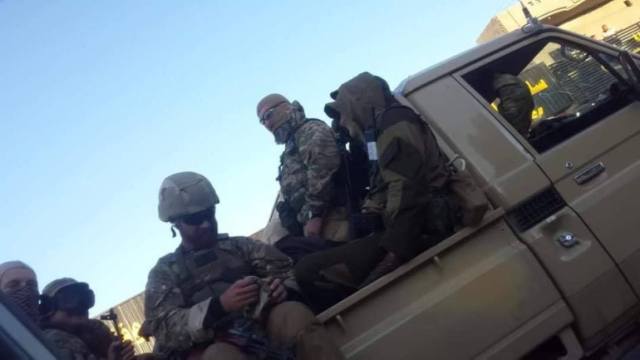The Spanish newspaper "La Panguardia" said that mercenaries are the biggest beneficiaries of the wars in Africa, as they started heading to the conflict areas in the brown continent after lucrative markets in Syria, Iraq, Afghanistan, Iraq and Ukraine receded, noting that most of the mercenaries in Africa - especially in Libya - are fighting under Cover of the Russian security company "Wagner".
The newspaper pointed out that Russia penetrates into the African scene with the same methods and arguments used historically by South Africa or the British or Americans, to justify its interference in the affairs of African countries.
Mercenaries work under the cover of security companies, and they are usually in the service of presidents facing internal problems, providing them with more effective services at less cost than somewhat disorganized armies and that would be a source of subsequent troubles when one of its elements considers a coup to overthrow the president.
Wagner is - in the opinion of the newspaper - another symbol of the rule of Russian President Vladimir Putin, and although Moscow denies this, American and British sources say that he who leads this company is Evgeny Brigozin, who is close to the Kremlin and has a direct personal relationship with President Putin.
Likewise, Prizuzin is considered one of the businessmen covered by the US Treasury Department sanctions against the backdrop of Russian involvement in the path of the 2016 US presidential elections.
Like all other major brands of Anglo-Saxon mercenaries, Wagner employs officers and soldiers willing to venture for salaries, bonuses and bonuses that are not paid by the regular armies.
Wagner's expansion is a synonym for the Russian-led diplomatic push to boost its influence in Africa. Last October, President Putin succeeded in organizing a Russian-African summit in Sochi, the first of its kind and attended by at least 43 heads of state or government. That summit reflects Moscow's growing interest in the brown continent, as Russia is the largest arms seller.
The newspaper quoted a European diplomatic source as saying that "Wagner is the best way for Russia to influence the ground in Africa, because it allows freedom of work and ease of movement, which is what traditional armies lack."
She cited another case of the interference of the "Wagens" company, which is the case of the Central African Republic, and said that its contracts there are more special at a time when that African country has lived since 2012 due to a war that involved Christian and Muslim militias and a number of feudal lords, which caused the displacement of one million people. That is, one fifth of the country's population.
The newspaper explains that the focus of "Wagner" is currently focused on the war taking place in Libya, where Russian aircraft transported between 800 and 1,200 of the company's mercenaries to Libya.
It notes that there is an international agreement against the recruitment, use, financing and training of mercenaries that entered into force in 2001 after nine years of negotiations, but none of the major countries signed it.
And "Labanguardia" quoted Nigerian Chris Kwaga - who is the UN Special Rapporteur on Mercenaries - as saying that "Wagner" has a bad reputation as a major threat to peace and stability due to its role in the African continent.
Kwaga added that Wagner's resort to employing mercenaries is an increasing challenge for Africa because of Africans' experience with mercenaries in the past, as happened in Sierra Leone and as is happening now in the Libyan arena.

